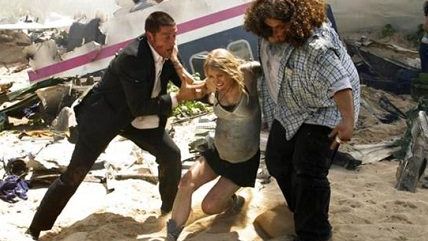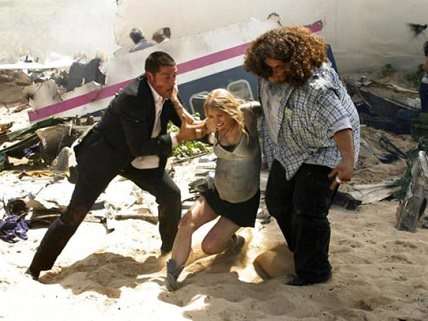The Libertarian Lesson of Lost
"Don't tell me what I can't do."


Exactly ten years ago today, Oceanic Airlines Flight 815 broke apart mid-air en route from Sydney to Los Angeles. The plane crash-landed on a sprawling desert island in the Pacific Ocean, stranding several dozen of the surviving passengers. These people—who came from different walks of life, but were linked by unseen threads—found the island to be a place of terror and wonder, inhabited by a strange creature made of black smoke, unfriendly natives, and an underground bunker where a shipwrecked Scotsman entered a code into a computer every 108 minutes.
Don't know what I'm talking about? Then you must have missed out on ABC's Lost, a defining cultural zeitgeist show of the previous decade. The show, which ran from 2004 to 2010, celebrates its 10th birthday today.
Lost was both an emotional, engrossing character drama and an addictive Clue puzzle that propelled millions of people onto online forums to discuss obscure theories after each episode aired. A decade later, its fan community is still active; a reunion and convention, organized by fans, took place in Hawaii this past weekend.
To my knowledge—and I say this as someone who spent his entire college career watching, researching, discussing, and writing about Lost—the show has never been claimed by libertarians as a libertarian-friendly viewing experience. In honor of Lost's 10th birthday, I'd like to correct that.
The central conflict of Lost cries out for a libertarian solution—and eventually gets one: celebrating peaceful co-existence, open borders, and the wisdom of questioning political authority in the process.
Throughout their time on the island, the Oceanic 815 crash survivors are terrorized by "the Others," the people already living on the island at the time of the crash. The Others regularly abduct members of the survivors' community, submit children to bizarre psychological tests, adhere to an incomprehensible moral code, and provide no explanation for their hostile actions. Main characters who spend significant time with the Others—such as Jack, Kate, Sawyer, and Sayid—are baffled by their antagonistic behavior. Even characters who switch allegiances—including Juliet and John Locke—fail to comprehend much.
It eventually becomes clear that the Others themselves don't know why they are in conflict with island newcomers; rank-and-file Others are merely taking orders from Ben, an appointed leader. But over the course of Lost's six seasons, as the main characters come to better understand Ben, he is revealed to be both a charlatan and a sociopath. He gives orders for two reasons, and two reasons only: either to assert and maintain his political authority, or to carry out the will of a higher power. There is in fact no natural reason for the Others to feud with the survivors. The animosity occurs because Ben needs conflict to perpetuate his authority and because someone else is pulling the strings.
And who is this string-puller? The enigmatic Jacob. Neither Ben nor any other Other has ever met Jacob; he relays messages to Ben and the Others by way of an intermediary. Finally, Jacob is revealed in the penultimate season to be an ancient figure living in seclusion and carrying out a war against his unnamed twin brother.
But Jacob isn't the arbiter of the Others' policies, either. Near the end of the series, viewers are treated to a flashback that establishes Jacob's origins. Jacob and his brother were born to a Roman woman named Claudia some 2,000 years before the start of the series. Claudia was shipwrecked on the island and murdered by the first Other, a woman that Jacob and his brother falsely came to call "Mother." Mother instilled in them a set of bizarre, specific instructions, and these orders began the island conflicts that would take place over the coming centuries. The Mother was "crazy," according to Jacob's brother, but even she was not the originator of the madness. In fact, the Mother stated that she was merely following the teachings of her own mother, who is never seen and presumably dead.
Centuries later, the conflict of Lost is entirely the by-product of generations of leaders blindly following the dictates of those who came before them, even if those dictates have no rational basis. Authority sustains later authority, and rules are followed over and over again until no one questions them. Political leadership is in fact part of a "long con" of false authority—a theme Lost touches on frequently, as several main characters are shown to be either the victims of con artists or con artists themselves.
In the series finale, the new leader, Hurley, proclaims his intention to run things differently. People will be free to come and go from the island, and various factions will no longer have cause to feud. It's undoubtedly a libertarian triumph. Tradition, superstition, tribalism, and deference to authority are denounced as self-perpetuating sources of unnecessary human conflict; voluntary association and free movement across borders are celebrated as the best way forward for peaceful existence on the island.
Of course, it wasn't just the message of Lost: the delivery of that message also tips its hat to free minds and free markets. Each week, fans would rush online to discuss the latest developments, enjoying an interactive storytelling experience with people from different communities all over the world while working alongside new friends to tackle the island's mysteries. Lost harnessed the new power of the viral web to weave a narrative that crossed different platforms, cultures, and ages. And thanks to modern technology, the adventure exists forever—anyone with a DVD player or Netflix account can return to the island.
Lost is all about challenging authority and seeking a non-coercive way to live together. Libertarians don't need to claim the show as theirs exclusively, but they should at least recognize it as friendly to their outlook.
"Don't tell me what I can't do!" - the oft-repeated motto of crash survivor John Locke


Show Comments (81)